RNCM Festival of Brass - Retrospective
31-Jan-2007Malcolm Wood looks back on the 2007 RNCM Festival of Brass, picks out his highlights and appreciates some of the ancillary events.
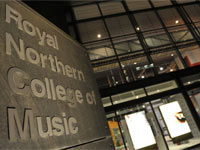 It seems incredible that this Festival of Brass has been in existence now for sixteen years.
It seems incredible that this Festival of Brass has been in existence now for sixteen years.
The event has appeared in two guises since its inception: The original concept saw bands going to the BBC Studios in Manchester to record a one hour programme to be broadcast on Radio 3 of challenging music. This format continued for a few years until the BBC dropped the programmes from its schedule. However, the opportunity to perform challenging works at one concert was something that was capitalised upon by the Royal Northern College of Music (RNCM) just a few hundred yards down Oxford Road.
All of the concerts now take place over one weekend and it's the ninth time that the Royal Northern has hosted the event. Its popularity has grown to such an extent that visitors from overseas are now in regular attendance. Audience numbers do vary over the weekend for different concert programmes, but there is an ever growing hard core of support which now underpins the event.
Year in, year out, the repertoire that is selected pushes the boundaries. Mental stamina is required by everybody but nobody in attendance really minds – this festival is the closest thing you get to the brass band version of the BBC Promenade concerts and it isn't for the faint hearted. The closest thing you got to light entertaining works this weekend were the marches from Elgar – if you can really call them that.
Each year the festival showcases the talents of a number of composers and this year was no different. Tribute was paid to the 150th anniversary of Elgar's birth, as well as Eric Ball and Robert Simpson, who died a decade ago. Joseph Horivitz who was 80 last year and Ray Steadman-Allen who was 85 also had something of a musical birthday celebration too. On the other hand was another mini strand with the airing of music from some of the finest young talent within the movement today. These included Simon Dobson, Gavin Higgins, Peter Meechan and Lucy Pankhurst.
Once again the bands in attendance here played some magnificent stuff with each concert containing at least one memorable item for the audience to savour.
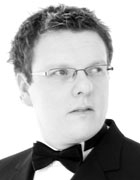 Those items are of course down to individual opinion, but certainly worthy of note were Richard Marshall's performance of the Aagaard-Nilsen 'Cornet Concerto', the RNCM's performances ‘Miners' by Robin Walker and ‘Heed the Word' by Lucy Pankhurst, the World Premiere of ‘Pictures in the Smoke' by Bramwell Tovey and ‘Nimrod' performed by Fodens. Then there was Runar Vaernes performance of ‘Trombel' with Leyland, Owen Farr in Gareth Wood's ‘Tenor Horn Concerto' accompanied by the Buy As You View Band whose performance of ‘The Promised Land' was colossal and arguably the individual performance of the whole festival, the very talented tuba player, Ben Thomson in the ‘Horovitz Tuba Concerto' with Brighouse. Last but not least, the whole concert programme by Eikanger-Bjorsvik Musikklag that was nothing short of stunning.
Those items are of course down to individual opinion, but certainly worthy of note were Richard Marshall's performance of the Aagaard-Nilsen 'Cornet Concerto', the RNCM's performances ‘Miners' by Robin Walker and ‘Heed the Word' by Lucy Pankhurst, the World Premiere of ‘Pictures in the Smoke' by Bramwell Tovey and ‘Nimrod' performed by Fodens. Then there was Runar Vaernes performance of ‘Trombel' with Leyland, Owen Farr in Gareth Wood's ‘Tenor Horn Concerto' accompanied by the Buy As You View Band whose performance of ‘The Promised Land' was colossal and arguably the individual performance of the whole festival, the very talented tuba player, Ben Thomson in the ‘Horovitz Tuba Concerto' with Brighouse. Last but not least, the whole concert programme by Eikanger-Bjorsvik Musikklag that was nothing short of stunning.
In addition to the concerts, the innovation of masterclasses and forums once again were very well attended. For the first time two pre-concert talks were given on the Friday and Saturday night to packed audiences, and for the third year in a row, some of bandings leading personalities discussed current issues within the movement in the Brass Herald Forum.
For the second year the Saturday morning saw some talented young composers get their music premiered by the RNCM Collective and the Besson masterclasses by Roger Webster and Steven Mead gave a number of instrumentalists the opportunity to learn from two great musicians.
If that wasn't enough for everybody, mini concerts were given by the Junior RNCM Brass Ensemble and Brass Mark 5 in between the lunchtime and afternoon concerts on Saturday and Sunday.
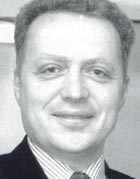 Finally, the whole event wouldn't be possible as always with sponsorship, the administrator, Philip Biggs and the Artistic Director, Paul Hindmarsh who during the weekend took the pressure off the conductor's by introducing a great deal of the music.
Finally, the whole event wouldn't be possible as always with sponsorship, the administrator, Philip Biggs and the Artistic Director, Paul Hindmarsh who during the weekend took the pressure off the conductor's by introducing a great deal of the music.
The movement is indebted to Paul who is the driving force for the Festival. Without Paul's enthusiasm, not too mention commitment and dedication to make sure the event takes place, nothing remotely like it would take place in the UK.
Brighouse conductor, Alan Morrison acknowledged Paul's contribution on Sunday evening at the final concert and Paul's efforts shouldn't go unrecognised. Thanks to Paul the BBC was once again in attendance and a week of programmes will be aired on BBC Radio 3 from Monday 5th through to Friday 9th February between 2-4pm and on Wednesday 7th February at 7.30pm,
Performance on 3 will broadcast what is anticipated to be Eikanger's programme in full. If you miss any of the broadcasts you'll be able to catch them for up to a week after transmission on the Radio 3 website – www.bbc.co.uk/radio3
No date has been confirmed for 2008 yet but it is hoped that Festival will take place once again at the RNCM.
Pre-Concert Talks
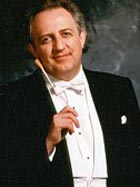 Within the classical music world, pre-concert talks are common place before the main event where those in attendance get the opportunity to gain a greater understanding of the music they'll hear from a composer and/or conductor.
Within the classical music world, pre-concert talks are common place before the main event where those in attendance get the opportunity to gain a greater understanding of the music they'll hear from a composer and/or conductor.
For brass band aficionado's attending band concerts this format was somewhat un-chartered territory but they certainly gave the idea the thumbs up by filling the Lecture Theatre on both Friday and Saturday night.
Friday's talk centred around the music Black Dyke was going to play. Professor Philip Wilby gave an informative and enjoyable talk on the evening's music with Dr Nicholas Childs and Anthony Payne, the composer and arranger of the opening work of the weekend, Elgar's ‘Pomp and Circumstance March Number 6'.
The following evening, Bramwell Tovey gave an insight into the art of conducting. Mr Tovey could have gone on all night as he had the audience eating out of the palm of his hand (as he did during the concert) but alas it was thirty minutes of passing on little gems that probably seem quite obvious but are not always observed.
If the hall had been filled by the current crop of Championship Section conductors the whole standard of brass band conducting in the UK would have gone up by 60% in a night.
Young Composers Premieres
For a second year Paul Hindmarsh with the help of John Miller and the RNCM Brass Collective introduced five new pieces from young composers who have written for brass band. The ages and experience within the movement varied but the purpose of the exercise was to give them the opportunity to talk about their works and how they came to write them, let the audience hear snippets and depending on the length, have them performed in full. The ultimate hope of course will be that they continue to write for the idiom.
The five chosen works and composers who can all be justly proud of their efforts were: ‘Fawkes', Christopher Gough; ‘Sinfonia II' (Dance Variations), Matthew Pollard; ‘Sound', David Onac; ‘Dune', Benjamin Tubb; ‘Colours through a Window', James McFadyen.
Besson Masterclass – Steven Mead
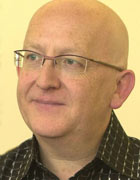 The names of Steven Mead and Roger Webster who gave Besson sponsored masterclass need no introductions whatsoever. Both are leading exponents of their craft and when they speak in a session such as this one on Sunday morning, you just sit back listen and learn.
The names of Steven Mead and Roger Webster who gave Besson sponsored masterclass need no introductions whatsoever. Both are leading exponents of their craft and when they speak in a session such as this one on Sunday morning, you just sit back listen and learn.
With just two hours available, five euphonium and a baritone player put themselves forward for some coaching and helpful tips from the maestro who like all fine exponents of their art is able to communicate with appreciable skill and clarity to their audience.
The standard of the participants varied, but each deserves enormous credit for putting themselves forward to play not just in front of Steven, but also in the presence of a large audience containing a number of players who are playing within the movement at the moment. It might have been a nervy process, most probably causing the odd sleepless night prior their mini-session, but an invaluable one that will aid them immensely with their playing in the future.
A number of key areas and points were covered by Steven during the two hour session from the positioning of the mouthpiece and the art of correct posture and breathing to the need to learn to relax and that most essential of requistes – the love and passion for what you do. It was an illuminating experience for one and all.
The Brass Herald Forum
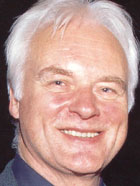 In between the afternoon and evening session on Sunday evening, Paul Hindmarsh, Elgar Howarth, John Miller, David Childs and Dr Robert Childs were joined by the Chairperson, Philip Biggs to discuss the all encompassing topic that is the brass band and how it could branch out into the wider musical world.
In between the afternoon and evening session on Sunday evening, Paul Hindmarsh, Elgar Howarth, John Miller, David Childs and Dr Robert Childs were joined by the Chairperson, Philip Biggs to discuss the all encompassing topic that is the brass band and how it could branch out into the wider musical world.
Each of the invited panelists gave their own opinions on how the movement is perceived outside our introverted bubble of existence and what we as bands and individuals can do to encourage other people to listen to our style of music making.
Quite a number of points were made and the discussion was healthy and robust, although with opportunities to talk openly about such broad issues within the movement, the proposed topic did go off at a tangent somewhat during its one hour duration.
Unfortunately though the audience voted with its feet on this occasion and there were more people in the bar and restaurant area getting refreshment than in the forum itself – last year was similar.
This was a major disappointment as whilst people are happy to discuss issues of concern within the banding media they seem to be not overly enthusiastic about sitting in a room listening to prominent figures within the movement talk passionately and share ideas about how we can be better perceived outside our idiom. The little bubble mentality it seems is alive and well and needs to be burst as soon as possible.
Perhaps a slightly better profile throughout the weekend may have helped (the programme didn't make a mention who was speaking) and it could have been pushed as being more relevant to those attending. Lets hope this continues as the last thing we need is to be beaten by people voting with their feet.
Malcolm Wood















